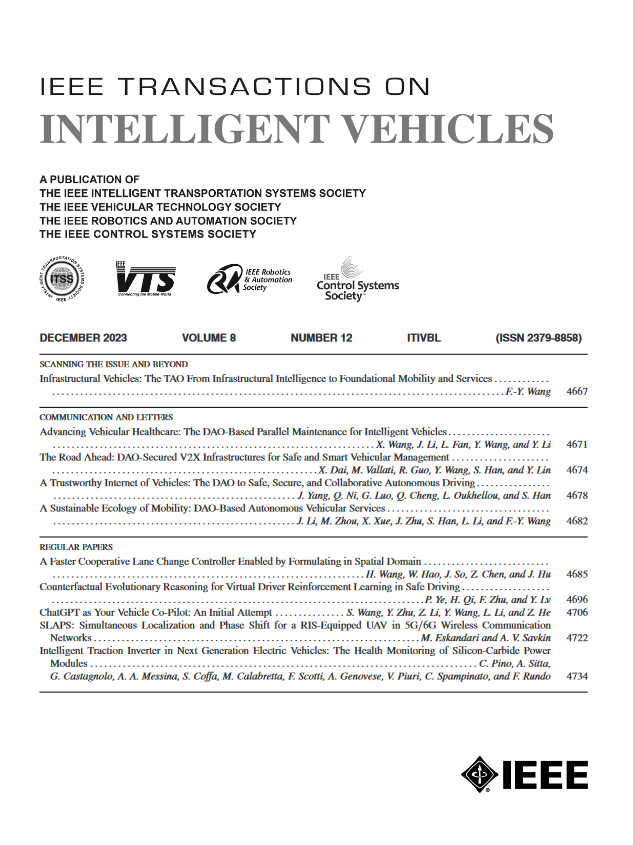Adaptive Square-Root Cubature Kalman Filter Based Low Cost UAV Positioning in Dark and GPS-Denied Environments
IF 14.3
1区 工程技术
Q1 COMPUTER SCIENCE, ARTIFICIAL INTELLIGENCE
引用次数: 0
Abstract
Routine inspection inside the water tank, pressure vessel, penstocks and boiler which present dark and global positioning system (GPS) denied environment always plays an important role for the safety storage and transportation. The conventional inspection conducted by the skilled workers is highly expensive, time consuming and may cause the safety and heath problem. Nowadays, the emerging unmanned aerial vehicle (UAV) based techniques make it possible to replace human to do the periodical inspection in these environments. However, how to obtain the reliable, high accuracy and precise position information of the UAV becomes a challenging issue, as the GPS is unable to provide the accurate position information in these environments. In order to resolve this problem, an adaptive square-root cubature Kalman filter (ASRCKF) based low cost UAV positioning system is designed. Through the combination of the inertial measurement unit (IMU), ultra-wideband (UWB), the cubature rule, the adaptively estimated noise model and weighting factors, the potential degradation and oscillation for the system performance which caused by the linearisation process, the variation of the measurement noise and the manually adjusted noise model are solved. Finally, the 0.081m median localisation error, 0.172m 95基于自适应平方根培养卡尔曼滤波的无人机在黑暗和gps拒绝环境下的定位
水箱、压力容器、压力管道和锅炉等处于黑暗和全球定位系统(GPS)屏蔽环境中的日常检查,对安全储运起着重要的作用。由技术工人进行的常规检查费用高,耗时长,而且可能造成安全卫生问题。近年来,以无人机为基础的技术的出现,使在这些环境中代替人工进行定期检测成为可能。然而,如何获得无人机的可靠、高精度和精确的位置信息成为一个具有挑战性的问题,因为GPS无法在这些环境中提供准确的位置信息。为了解决这一问题,设计了一种基于自适应平方根立方卡尔曼滤波(ASRCKF)的低成本无人机定位系统。通过结合惯性测量单元(IMU)、超宽带(UWB)、cubature规则、自适应估计噪声模型和加权因子,解决了线性化过程、测量噪声变化和人工调节噪声模型对系统性能的潜在退化和振荡问题。最终获得0.081m中位定位误差、0.172m 95$^{th}$百分位定位误差和0.045m平均标准偏差(STD),可支持无人机在黑暗和无gps环境下实现自主巡检。
本文章由计算机程序翻译,如有差异,请以英文原文为准。
求助全文
约1分钟内获得全文
求助全文
来源期刊

IEEE Transactions on Intelligent Vehicles
Mathematics-Control and Optimization
CiteScore
12.10
自引率
13.40%
发文量
177
期刊介绍:
The IEEE Transactions on Intelligent Vehicles (T-IV) is a premier platform for publishing peer-reviewed articles that present innovative research concepts, application results, significant theoretical findings, and application case studies in the field of intelligent vehicles. With a particular emphasis on automated vehicles within roadway environments, T-IV aims to raise awareness of pressing research and application challenges.
Our focus is on providing critical information to the intelligent vehicle community, serving as a dissemination vehicle for IEEE ITS Society members and others interested in learning about the state-of-the-art developments and progress in research and applications related to intelligent vehicles. Join us in advancing knowledge and innovation in this dynamic field.
 求助内容:
求助内容: 应助结果提醒方式:
应助结果提醒方式:


